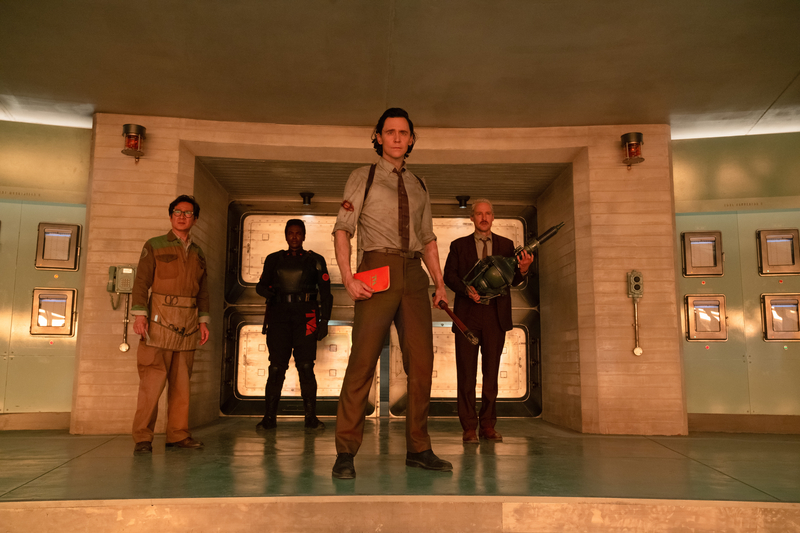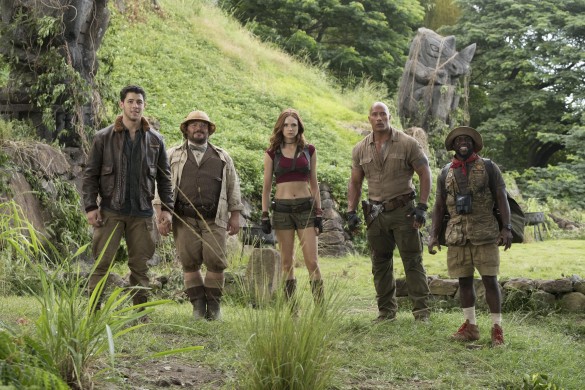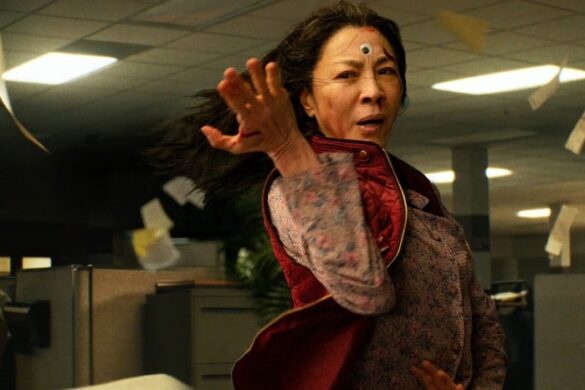The Marvel Cinematic Universe’s multiverse saga is a crazy and convoluted place full of twists, turns, and enough retcons to make your head spin off your body. And yet, it remains a fascinating place to explore because of its intrigue and mystery. It also helps to have someone like Loki (Tom Hiddleston) as your guide navigating through the complexities of the TVA, timelines, and the confusing rules that glue it together. And with “Loki” season 2, the god of mischief who cheated death suddenly has a new perspective on life. When he finally meets a threat he cannot manipulate or control, he sees the bigger picture and realizes what is at stake.

While season one saw Loki being the outlier of the TVA by breaking all of the rules of the bureaucratic time-traveling protection agency, it also gave the god of mischief a glorious purpose to exist beyond being just the delicious villain we all enjoyed watching. Now, he’s become the anti-hero of trickery and deception, bringing out his vulnerabilities and making him more human. And much of that had to do with director Kate Herron and head writer Michael Waldron guiding the character where he needed to go.
But season two veers away from Loki’s quest for salvation and has him face to face with the consequences of his inability to stop Sylvie (Sophia Di Martino) from killing He Who Remains (Jonathan Majors). During his existential crisis, he learned about time travel, timelines branching out, and how he was a variant who didn’t claim the glory he sought. Not only did he see how insignificant he was, but he was also very humbled. And yet, he still managed to be deliciously villainous as he aimed to take control of his own life and no longer have his strings pulled. This arc was meant for him and us to discover what makes a Loki a Loki. But now, we are here to find out if Loki can become a hero or if he will revert to becoming what everyone who doubts his good intentions believes he is… a villain.
Much of the show tries to convince Loki to embrace the villain inside him even though he is trying to be the hero. TVA loyalists like X-5/Brad Wolfe (Rafael Casal) try to get under Loki’s skin by telling him he’s an agent of chaos and all he does is make things worse. Adding to the pressure, Loki is told he’s a loser and won’t be recognized as a savior. As such, Loki has to prove otherwise, and we get to see how he’s matured and uses his mischief to his advantage to get the necessary info to find Sylvie. These episodes also show us some role reversal in the Loki and Mobius dynamic. The usual calm and composed Mobius gets annoyed and exasperated when X-5 doesn’t cooperate. Instead, we see how far along Loki has come since he started as a mischievous agent of chaos.
Critics were granted a four-episode preview of the upcoming new season. While they managed to tie a few loose ends left behind in Season 1, it also had to expand the worldbuilding and establish new rules. However, with a new season also comes a new creative guard. Director Kate Herron and head writer Michael Waldron have stepped away, with “Moonknight” directors Justin Benson and Aaron Moorhead stepping in to helm a few episodes and Eric Martin penning all six episodes. Each is more interesting and complicated than the next. The TVA is in a new place right now, and with it, some are fighting over its control for their own purposes, while others are trying to save it. Digging deeper into each character’s motivations, we see what the TVA means to them and how the agency should be utilized. Clearly, the death of He Who Remains created a power vacuum, and nature abhors a vacuum.
Much of the new season centers around the idea of reformation. Loki is a much different person than he was before. Suffering the effects of time slipping, a form of chronological glitching that painfully looks like he is being born, dying, or both simultaneously, according to Mobius (Owen Wilson). Loki is reunited with his time-traveling partner and is determined to stabilize himself and save the multiverse from certain doom. Still, he is deliciously villainous when he needs to be and evil when the time calls for it, but he has found his glorious purpose. He has found his destiny. It’s been at the TVA. While his employment ultimately meant being an agent of chaos, the events about to transpire because of the impending threat brought on by Sylvie killing He Who Remains has changed his perspective. And now that the TVA has realized that they’ve committed various atrocities by taking variants’ lives and pruning branches without a second thought, the newly reformed TVA intends to be more merciful. It’s the loyalists that Loki, Mobius, B-15 (Wunmi Mosaku), and others need to watch out for.
Season 2 introduces a few new characters. Ouroboros, or O.B., is the TVA’s head of Research and Assistance – which looks like a mail room full of pneumatic tubes. He’s the smartest person in the agency who wrote the handbook on chronological procedures and vintage technology. These vintage timepieces are either falling apart or put together by hammering random objects or duct-taping cracks in suits that protect the wearer from temporal radiation that could melt your skin off. Watching O.B. respond to Loki and Mobius’ concerns about possibly dying by being lost to time or having your skin melted off the body with nonchalant answers is hilarious.
The other newest character is Victor Timely, another He Who Remains variant, who has received O.B.’s book thanks in no small part to Ravonna Renslayer (Gugu Mbatha-Raw) and Miss Minutes’ (Tara Strong) careful manipulation of events that will occur. Major’s performance differs from Kang or He Who Remains, which is a challenging feat. While Kang is full of rage and anger in “Ant-Man and the Wasp: Quantumania,” and He Who Remains is enigmatic and mysterious, Victor Timely is timid, curious, and a bit of a charlatan. He isn’t so much the antagonist we’d like to think of him to be, and the series wants us to believe he isn’t like any of his villainous variants. So it will be interesting to see how his character will impact the series as it races towards its finale and the entire Multiverse Saga.
Sylvie has a new lease on life now that she has autonomy over the decisions she gets to make. She is no longer forced to go on a path that has already been written. Instead, she gets to experience a life she’s never experienced before and is free from the threats of being pruned after being mercilessly chased by the TVA. This includes eating an entire menu at McDonald’s and later choosing to work as a cashier there. She’s built a new life and lives in a branched timeline where she can be happy. However, the temporal meltdown remains a real threat, and without the TVA to defend against all of He Who Remain’s variants, Loki and the rest of the reformed TVA need her help. Unfortunately, the show’s explanation is a little convoluted and may require a few playbacks to understand.
Though the time-traveling aspect is fun, keeping up with the who and the when isn’t as simple or clean. In fact, all the new rules and extra world-building make things even more complicated. While Loki is being pulled in and out of time, it is challenging to keep up with which Loki is which and where he is in the larger chronological picture. You can feel the show grinding to make new concepts work. Of course, characters like O.B. and a quirkier, kinder, and more curious version of He Who Remains help keep things light.
But temporal confusion of the show is a mere table setting for something that leads to a bigger reveal. It takes a while to get there, and by the time we do, it does feel like a little bit of a letdown. Sure, the mystery and intrigue put a new spin on what the MCU is now and what it could be after the fact. The first few episodes spend so much time and energy trying to get their characters in one place in time while providing the audience the necessary albeit confusing exposition needed to understand what is going on. And there’s a lot of exposition to understand what is at stake for everyone. There’s an existential crisis, and time and space are on the verge of a meltdown. And everyone in the TVA will remind us that we will all die if each crisis isn’t resolved in time.
A lot of that confusion has to do with the fact that there has been a large gap between seasons, and the films don’t seem to acknowledge the effects of the series’ events – other than what happened in “Ant-Man and the Wasp: Quantumania.” The film’s post-credit scene circles back to one of Season 2’s new episodes when Loki sees Victor Timely, who he believes is a He Who Remains variant. They need Victor to unlock the blast doors because he is a variant who has He Who Remain’s temporal aura.
Each new episode is less of a procedural case that needs to be solved but one larger one that can be exhausting to follow. There are long bouts of what Loki needs to do to get to one point, only to find out that he needs to go through another long and exhausting spell of what he needs to do next to get to another point. And so on and so forth. It’s an endless loop that is better off closed sooner rather than later.
The trouble with being a mind-bending time-traveling procedural that examines themes of existence and reformation is that it puts so much focus on how time and space function within the MCU and trying to be its own thing by writing and rewriting the rules that it forgets to tell a clear and coherent story. The show continues to veer away from the typical MCU formula to become something that’s very different from what we expect a comic book show to be. And that’s fine to a certain degree. Luckily, Hiddleston’s charm is enough to keep us glued to what’s happening. His banter with Wilson and Martino clearly carried over to the new season. While Quan’s O.B. is a welcomed addition to the show and adds to the Loki and Mobius dynamic. He’s the one who can complete each of their sentences at different points in time.
It’s absolutely maddening that a show with such frenetic pacing and deliberate narrative chaos can be as entertaining as it is. The new season is packed full or stories and even more challenges and larger stakes for our protagonists to confront and overcome. And and yet it can feel like creating temporal pandemonium is prioritized over creating a compelling and coherent story. There are time loops, branched timelines, and rogue TVA agents put in very tiny boxes. And that extra world building, establishing new rules, and table setting can be equally fun and frustrating. It allows the show to introduce new characters like O.B. or have us see He Who Remains variants like Victor Timely in a new light. While the stakes are higher, it will be interesting to see if any of it has the kind of payoff that leads to something more significant for the MCU.
7.75/10










